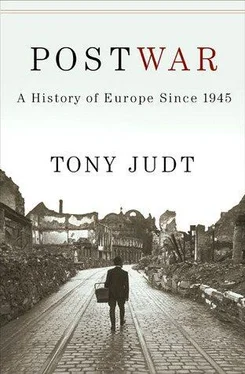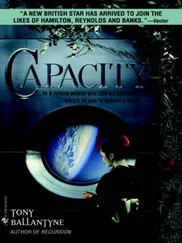The Papon trial, which lasted six months, revealed no new evidence—except perhaps about the man himself, who displayed an astonishing absence of pity or remorse. And of course the trial came fifty years too late: too late to punish the octogenarian Papon for his crimes; too late to avenge his victims; and too late to save the honour of his country. A number of French historians, called to testify as expert witnesses, declined to appear. Their task, they insisted, was to recount and explain what had happened in France fifty years before, not deploy that knowledge in a criminal prosecution. [425]But the trial was exemplary nonetheless. It demonstrated conclusively that the fine distinction between ‘Vichy’ and ‘France’ so carefully drawn by everyone from De Gaulle to Mitterrand had never existed. Papon was a Frenchman who served the Vichy regime and the subsequent French Republic: both of which were fully aware of his activities in the Bordeaux prefecture and neither of which was troubled by them.
Moreover, Papon was not alone—indeed both the man and his record were decidedly commonplace. Like so many others, all he had done was sign the death warrants of people he never met and to whose fate he was indifferent. The most interesting thing about Papon’s case (and that of Bousquet, too) was why it had taken official France nearly fifty years to locate them in its midst—and why, at the very end of the century, the crust of silence finally broke open. There are many explanations, not all of them flattering to the French political class or national media. But the passage of time, together with the psychological significance of the ending of an era, is perhaps the most pertinent.
So long as François Mitterrand remained in office, he incarnated in his very person the national inability to speak openly about the shame of the occupation. With Mitterrand’s departure, everything changed. His successor, Jacques Chirac, had been just eleven years old when France was liberated in 1944. Within weeks of taking office, on the fifty-third anniversary of the same round-up of Parisian Jews about which Mitterrand had always been so circumspect, President Chirac broke a fifty-year taboo and pointedly acknowledged for the first time his country’s role in the extermination of the Jews of Europe. Ten years later, on March 15th 2005, at the newly inaugurated Holocaust Museum in Jerusalem, Chirac’s Prime Minister, Jean-Pierre Raffarin, solemnly declared: ‘La France a parfois été le complice de cette infamie. Elle a contracté une dette imprescriptible qui l’oblige’. ‘France was at times an accomplice in this shame. She is bound forever by the debt she has incurred’.
By the end of the twentieth century the centrality of the Holocaust in Western European identity and memory seemed secure. To be sure, there remained those occasional individuals and organisations—‘revisionists’—who persisted in trying to show that the mass extermination of the Jews could not have taken place (though they were more active in North America than in Europe itself). But such people were confined to the extreme political margins—and their insistence upon the technical impossibility of the genocide paid unintended homage to the very enormity of the Nazi crime. However, the compensatory ubiquity with which Europeans now acknowledged, taught and memorialized the loss of their Jews did carry other risks.
In the first place, there was always the danger of a backlash. Occasionally even mainstream German politicians had been heard to vent frustration at the burden of national guilt—as early as 1969 the Bavarian Christian Social leader Franz-Josef Strauss relieved himself in public of the thought that ‘a people that has achieved such remarkable economic success has the right not to have to hear anymore about “Auschwitz”.’ Politicians of course have their reasons. [426]What was perhaps more indicative of a coming cultural shift was a widespread urge, at the beginning of the twenty-first century, to re-open the question of German suffering after years of public attention to Jewish victims.
Artists and critics—among them Martin Walser, Habermas’s contemporary and an influential literary voice in the post-war Federal Republic—were now starting to discuss another ‘unmanaged past’: not the extermination of the Jews but the under-acknowledged other side of recent German history. Why, they asked, after all these years should we not speak of the burning of Germany’s cities, or even of the uncomfortable truth that life in Hitler’s Germany (for Germans) was far from unpleasant, at least until the last years of World War II? Because we should speak instead of what Germany did to the Jews? But we’ve spoken of this for decades; it has become a routine, a habit. The Federal Republic is one of the most avowedly philo-Semitic nations in the world; for how much longer must we (Germans) look over our shoulder? New books about ‘the crimes of the Allies’—the bombing of Dresden, the burning of Hamburg and the wartime sinking of German refugee ships (the subject of Im Krebsgang , ‘Crabwise’, a 2002 novel by Günter Grass)—sold in huge numbers.
In the second place, the new-found salience of the Holocaust in official accounts of Europe’s past carried the danger of a different sort of distortion. For the really uncomfortable truth about World War Two was that what happened to the Jews between 1939 and 1945 was not nearly as important to most of the protagonists as later sensibilities might wish. If many Europeans had managed to ignore for decades the fate of their Jewish neighbours, this was not because they were consumed with guilt and repressing unbearable memories. It was because—except in the minds of a handful of senior Nazis—World War Two was not about the Jews. Even for Nazis the extermination of Jews was part of a more ambitious project of racial cleansing and resettlement.
The understandable temptation to read back into the 1940s the knowledge and emotions of half a century later thus invites a rewriting of the historical record: putting anti-Semitism at the centre of European history. How else, after all, are we to account for what happened in Europe in those years? But that is too easy—and in a way too comforting. The reason Vichy was acceptable to most French people after the defeat of 1940, for example, was not that it pleased them to live under a regime that persecuted Jews, but because Pétainist rule allowed the French to continue leading their lives in an illusion of security and normality and with minimum disruption. How the regime treated Jews was a matter of indifference: the Jews just hadn’t mattered that much. And much the same was true in most other occupied lands.
Today we may find such indifference shocking—a symptom of something gravely amiss in the moral condition of Europe in the first half of the twentieth century. And we are right to recall that there were also those in every European country who did see what was happening to Jews and did their best to overcome the indifference of their fellow citizens. But if we ignore that indifference and assume instead that most other Europeans experienced the Second World War the way Jews experienced it—as a Vernichtungskrieg , a war of extermination—then we shall furnish ourselves with a new layer of mis-memory. In retrospect, ‘Auschwitz’ is the most important thing to know about World War Two. But that is not how things seemed at the time.
It is also not how things seemed in eastern Europe. To east Europeans, belatedly released after 1989 from the burden of officially mandated Communist interpretations of World War Two, the fin-de-siècle Western preoccupation with the Holocaust of the Jews carries disruptive implications. On the one hand, eastern Europe after 1945 had much more than western Europe to remember—and to forget. There were more Jews in the eastern half of Europe and more of them were killed; most of the killing took place in this region and many more locals took an active part in it. But on the other hand, far greater care was taken by the post-war authorities in eastern Europe to erase all public memory of the Holocaust. It is not that the horrors and crimes of the war in the east were played down—on the contrary, they were repeatedly rehearsed in official rhetoric and enshrined in memorials and textbooks everywhere. It is just that Jews were not part of the story.
Читать дальше












